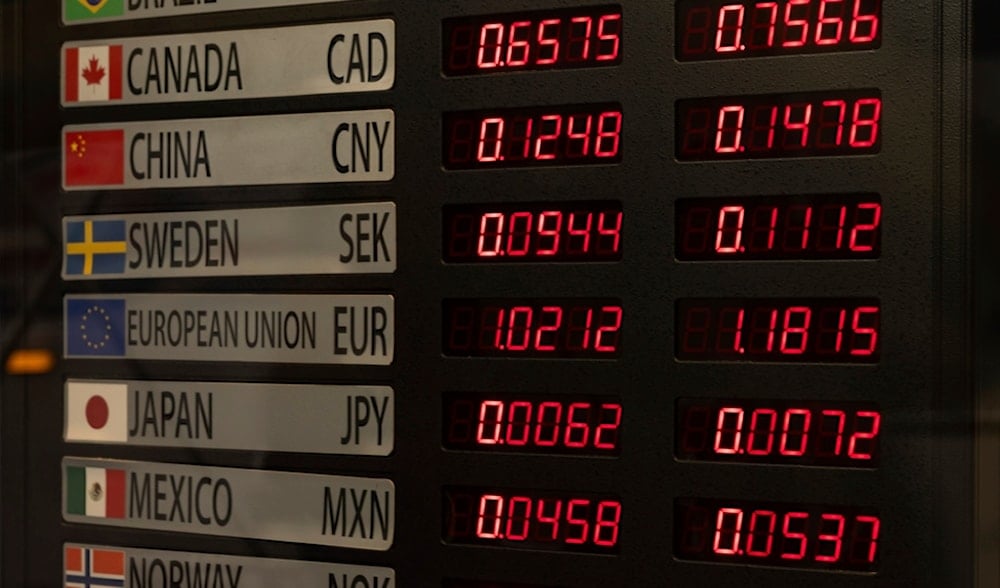Debt crisis in developing countries demands global reform: FT
In a Financial Times article, Joseph Stiglitz warns that the debt crisis in developing countries is worsening and calls for urgent global reform to prioritize human development over financial markets.
-

Electronic board shows currency prices at a currency exchange near Grand Central Station, Tuesday, April 8, 2025, in New York. (AP)
Joseph Stiglitz, in his Financial Times feature "Debt is crushing the developing world," argues that the late Pope Francis was right to raise the alarm over the growing debt crisis in developing countries, and to link it with the broader issues of global financial justice, human dignity, and intergenerational responsibility.
Far from fading, the crisis is worsening, especially in low- and lower-middle-income countries (LLMICs), where debt burdens are now directly undermining development.
While these countries may be avoiding outright defaults, they are increasingly defaulting on development. Pressed by rising obligations, governments are diverting public funds from essential services such as education, healthcare, infrastructure, and climate adaptation to meet debt repayments that were contracted under far more favorable global financial conditions.
According to data from UNCTAD, 54 countries now spend more than 10% of their tax revenues on interest payments alone. Since 2011, the average debt burden on low-income countries as a share of tax revenues has nearly doubled.
Today, over 3.3 billion people live in countries where more money is spent on servicing debt than on health, and 2.1 billion live in countries that allocate more to debt than to education. This is not a formula for sustainable development, it is a major roadblock to progress.
The situation is further exacerbated by rising borrowing costs. Debt issued after the 2008 global financial crisis, when interest rates were near zero, is now being rolled over at significantly higher rates. Even as spreads have eased following the pandemic and the war in Ukraine, capital markets remain largely inaccessible for many LLMICs. Slower global growth continues to erode debt sustainability, making it harder for these economies to recover.
The present crisis reflects a deeper systemic failure in the architecture of international finance. Whereas capital flows counter-cyclically to advanced economies, offering support during downturns, it moves pro-cyclically for developing nations, intensifying the impact of shocks.
In 2023, net external transfers turned negative, with low- and middle-income countries (excluding China) experiencing a $30 billion net outflow to the private sector on long-term debt, a modest improvement from $50 billion in 2022, but still a significant drag on development.
Multilateral institutions are not doing enough
Multilateral institutions and debt relief mechanisms have also fallen short. Net transfers from the International Monetary Fund (IMF) to LLMICs surged during the pandemic but have since collapsed, from a positive $22 billion in 2020 to minus $5 billion in 2023. This sharp reversal is driven by lower disbursements and higher interest costs.
Without the intervention of multilateral development banks (MDBs), the situation would be even graver. These institutions have been providing the hard currency that many poor countries are now using to repay private creditors, rather than investing in true development objectives.
According to Stiglitz, Pope Francis offered the kind of moral and political leadership that has been largely absent among global stakeholders. His call for a jubilee year focused on debt justice is not just symbolic, it is a necessary step toward restructuring a system that is failing billions.
In response to his call, a Jubilee Commission was created at the Pontifical Academy of Social Sciences. Co-led by Martin Guzmán and chaired by the author of this piece, the commission comprises leading economists, legal scholars, and development practitioners. On June 20, the group will present a comprehensive report outlining a blueprint for reform, based on the principle that debt sustainability must not come at the cost of human development.
Trump's tariffs could amplify structural vulnerabilities
Meanwhile, many LLMICs rely heavily on export revenues to service their debts and fund public services. Given the United States' leading role in the global economy, the Trump administration’s tariffs, especially those targeting China, triggered retaliatory tariffs and a global slowdown in trade volumes, impacting supply chains and reducing global demand. Countries supplying intermediate goods or raw materials to China and other major economies saw lower export income, which tightened their fiscal space.
Trade tensions also increase uncertainty in financial markets, causing capital to flow back to safe assets in developed economies. As Stiglitz notes, capital tends to move pro-cyclically in developing countries, leaving when it is most needed. This results in higher borrowing costs and fewer financing options for vulnerable economies.
The tariff policies during Trump's first term set a precedent for renewed protectionism, undermining the multilateral trade system. This weakened the economic positions of countries that depend on open markets and preferential access, many of which are heavily indebted and have limited leverage in renegotiating terms or trade relationships.

 5 Min Read
5 Min Read










